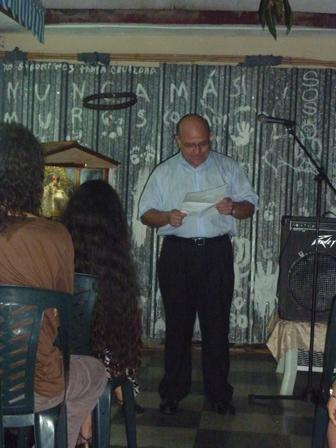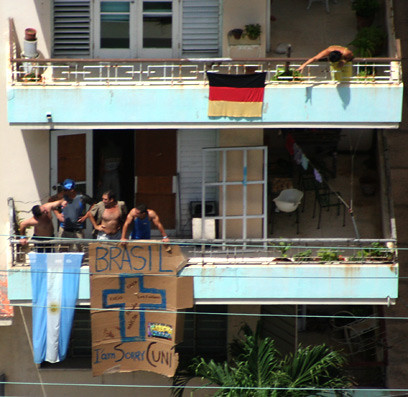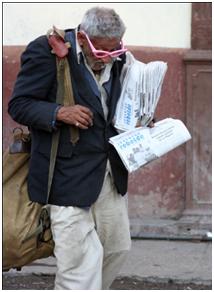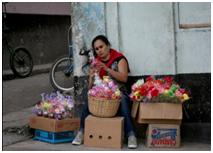A few months ago I dedicated a post to Juan Carlos Herrera Acosta. I made reference to his diseases and briefly mentioned all the injustices that have been committed against the independent journalist from Guantanamo who was jailed together with 74 other Cubans during the Black Spring of 2003.
On June 29 I visited Caridad Caballero Batista in Holguin to see how she was doing after the violent moments she experienced along with Mariblanca Avila, Reina Luisa, and her family in Banes on Saturday June 26. A call from Juan Carlos Herrera Acosta from a hospital in Guantanamo surprised us both. He told us that the officials who took him to the doctor allowed him to make one telephone call and that is why he chose to call Holguin to testify to what he was living through in that place where he was taken a few weeks ago as a result of the changes of prisons for some political prisoners after the negotiations between Raul Castro and Jaime Ortega.
We were barely able to record the conversation with an old and beat-up voice recorder. Cari told him that his conversation would be recorded so that he could say everything he desired.
We transcribed the call because the sound lacked quality due to all the interruptions of the telephone lines:
“I was transferred to a polyclinic here in the municipality of Salvador so that I could be attended by a orthopedic specialist to see if they could finally all agree on what it is that I have in my cervical zone. There are no records of X-Rays, no clinical exams, no information even on all my previous jailings in this same prison in Guantanamo [he is referring to clinical documents that every previously interned patient is supposed to have]. Nothing shows up, so tomorrow I am going to be taken again to the polyclinic, the same way a terrorist is escorted somewhere [here he is referring to the security measures they take with political prisoners from the cause of the 75 who are moved around with handcuffs and chains and lots of security officials around them]. I think that Bin Laden would be treated with much better conditions than myself. I was completely surrounded by State Security as if I was some sort of assassin.”
“Really, my health situation is worrisome. It’s been 15 days that I have had diarrhea, and I repeat, my sugar level has dropped, I have constant hypoglycemia, the water here generally is really not potable, even that the people drink. The situation gets worse because I am under special rules. I continue denouncing the strict and inhumane regime that is imposed in Cuban jails.”
This is the other Guantanamo that nobody talks about. The Guantanamo of the other side, the one here in my province, the place where I was born. It is not the North-American enclave. This Guantanamo is the one the Cuban government does not mention.
The 26th was the official day designated by the UN as International Day of Awareness Against Torture, and the Cuban government only very briefly mentioned it.
I continue saying that Juan Carlos, here or anywhere else, will continue to stand up against terror. They must know that Juan Carlos has suffered a lot because, disgracefully, it has not just been the blows dealt him by military officials during these 7 years of prison, but also the brutal pain of a father who lost his only daughter, who lost a friend, and a brother, practically right next to him, Orlando Zapata Tamyo. (Orlando Zapata, before being transferred on December 2, 2009 to the jail in Camaguey was in the provincial prison of Holguin together with Juan Carlos Herrera, and even though they kept them in separate cells, they discretely managed to communicate between themselves thanks to other prisoners who would pass on their messages.)
“They are using methods of psychological torture and physical torture as well, because being here in my province does not mean anything when my family can only visit me once every 3 months and once every 4 months for the conjugal pavilion.”
But then I ask myself, and I ask the government: “Will they manage to get Juan Carlos Herrera Acosta on his knees?” Nobody will be able to. And for being like that, he may very well be the next victim.
“I have already lived here for 5 sad years, totally isolated like a savage beast. What I am doing is calling out to the CPJ, the Committee for the Protection of Journalists, to Reporters Without Borders, to Amnesty International, to anyone and everyone who can help. I’m not asking for my freedom because I never should have come to this prison in the first place, I should have never have been a prisoner, not even for a minute, because I have committed no crime. I have not attacked any military barracks, I have not attacked a single soldier, I haven’t done anything, I have just written down the truth, I have spoken the truth since 1988, more than half of my life doing this. I will be here defending this grand thing that is democracy and freedom, even if I continue imprisoned.”
Translated by Raul G.
To comment on this article please visit:
Luis Felipe’s Blog: Crossing the Barbed Wire.



 Cuba produces passions, but also pain. I am taking the liberty of reprinting here the comments of some readers, showing how much this island in the Caribbean Sea is hurting.
Cuba produces passions, but also pain. I am taking the liberty of reprinting here the comments of some readers, showing how much this island in the Caribbean Sea is hurting. Sandy Olivera is a young Cuban who, two years ago, emigrated as a political refugee to the United States. His girlfriend remained on this side of the sea. A week ago, he returned to Cuba to marry her.
Sandy Olivera is a young Cuban who, two years ago, emigrated as a political refugee to the United States. His girlfriend remained on this side of the sea. A week ago, he returned to Cuba to marry her. Cubans are outcasts in their own land. Both those who reside in the country, as well as those living abroad. The latter are doubly discriminated against. They cannot invest in the economy because they are citizens of the State, yet when they return to the country they are treated as foreigners.
Cubans are outcasts in their own land. Both those who reside in the country, as well as those living abroad. The latter are doubly discriminated against. They cannot invest in the economy because they are citizens of the State, yet when they return to the country they are treated as foreigners. Fifty years ago, on May 10, 1960, the Matamoros Trio, headed by Siro Rodriguez, Rafael Cueto, and Miguel Matamoros, performed in public for the last time. They bid their farewells on the program called Partagas Thursdays, one of the most popular Cuban TV shows at the time.
Fifty years ago, on May 10, 1960, the Matamoros Trio, headed by Siro Rodriguez, Rafael Cueto, and Miguel Matamoros, performed in public for the last time. They bid their farewells on the program called Partagas Thursdays, one of the most popular Cuban TV shows at the time. It is fair to acknowledge that foreign investment in Cuba brings benefits to the economy. But by itself it is not the solution for confronting the overwhelming problems.
It is fair to acknowledge that foreign investment in Cuba brings benefits to the economy. But by itself it is not the solution for confronting the overwhelming problems.
